Production
Kabut Sutra Ungu was produced and directed by Sjumandjaja. It was his first film in over a year, following Yang Muda Yang Bercinta (The Young Fall in Love; 1978); the film's extended issues with the Indonesian censorship bureau, as well as his own poor health, had led Sjumandjaja to take a hiatus.
Sjumandjaja adapted the screenplay from the novel of the same name by Ike Soepomo, who had recently made her debut. Although he had previously heard his friends praise the novel, he first read it when an attendant on a train offered him a selection of books as reading material. Ultimately Sjumandjaja put a planned film on the Wali Songo on hold and began an adaptation. Production began in October 1979.
The film, made for Matari Artis Jaya Film, saw Leo Fioole on camera and Berthy I Lindia as artistic director. In post-production Sudharnoto handled music while Suparman Sidik did sound. The film was edited by Janis Badar.
The film starred Jenny Rachman and Roy Marten, with other roles handled by actors including El Manik, Sys NS, Ami Priyono, Farouk Afero, and Chitra Dewi. Rachman, then rising in popularity, refused several offers so that she could take a role in Kabut Sutra Ungu.
Emmanuel Ginting Manik or better known as El Manik is an Indonesian actor of Karo descent.
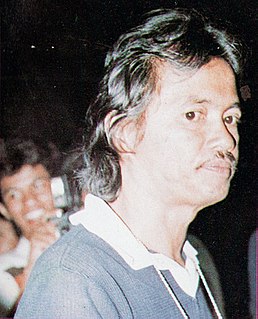
Sjumandjaja was an Indonesian director, screenwriter, and actor. During his career he wrote numerous films, directed fourteen, acted in ten, and produced nine; he also won five Citra Awards from the Indonesian Film Festival. His films reflected social realism.
Haryo Heroe Syswanto Ns. Soerio Soebagio, better known as Sys NS, was an Indonesian radio personality and politician.

Lewat Tengah Malam is a 1971 Indonesian film and the first feature-length production by director Sjumandjaja. Starring Rachmat Hidayat, Rima Melati, and Soekarno M. Noer, it follows a thief named Lono who steals from the corrupt to give to the poor. The film, which may have been influenced by The Thomas Crown Affair (1968), was reportedly very tiring for the director, who briefly considered never directing again. The social realist elements led to Suharto's New Order government keeping Sjumandjaja under surveillance.

Atheis is a 1974 Indonesian film directed by Sjumandjaja and adapted from Achdiat Karta Mihardja's novel of the same name. It follows a young Muslim man named Hasan who, through his interactions with others, loses his faith.
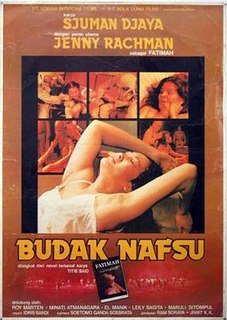
Budak Nafsu is a 1983 Indonesian film directed by Sjumandjaja and adapted from the 1981 novel Fatima by Titie Said. Starring Jenny Rachman and El Manik, it follows a mother who is forced to serve as a comfort woman for Japanese men stationed in British Malaya in an effort to save her daughter. The film was a commercial success, although critics have emphasised its sexual aspects.
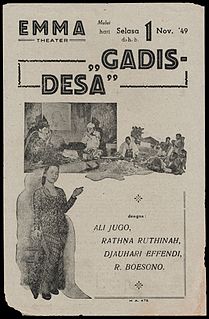
Gadis Desa is a 1949 comedy from what is now Indonesia written and directed by Andjar Asmara. Starring Basuki Djaelani, Ratna Ruthinah, Ali Joego, and Djauhari Effendi, it follows the romantic hijinks of a village girl who is taken to be a rich man's second wife. The film, produced by a Dutch-run company, is recognised as the first in which future "father of Indonesian film" Usmar Ismail was involved.

Pengkhianatan G30S/PKI is a 1984 Indonesian propaganda docudrama written and directed by Arifin C. Noer, produced by G. Dwipayana, and starring Amoroso Katamsi, Umar Kayam, and Syubah Asa. Produced over a period of two years with a budget of Rp. 800 million, the film was sponsored by Suharto's New Order government. It was based on an official history of the 30 September Movement coup in 1965 written by Nugroho Notosusanto and Ismail Saleh, which depicted the coup as being orchestrated by the Communist Party of Indonesia.
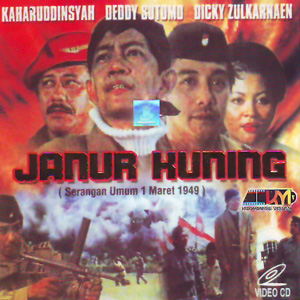
Janur Kuning is a 1980 Indonesian war film directed by Alam Surawidjaja and produced by Abbas Wiranatakusuma. Starring Kaharuddin Syah, Deddy Sutomo, and Dicky Zukarnaen, it follows the Indonesian revolutionaries six-hour assault on Yogyakarta, under Suharto, in a show of force against the Dutch army. At the time the most expensive domestic production ever, the film's title is meant to symbolise the Indonesian people's struggle. A critical success, Janur Kuning received a nomination and two special awards at the 1980 Indonesian Film Festival. It was screened annually on 1 March between 1980 and 1998, but has since been criticised as an attempt to manipulate history and create a cult with President Suharto in the centre.
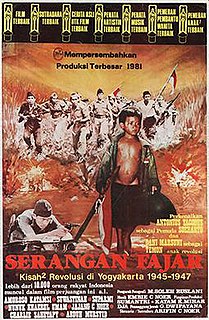
Serangan Fajar is a 1982 Indonesian war film directed by Arifin C. Noer and produced by G. Dwipayana. Telling the lives of several persons during the Indonesian National Revolution, the film used wayang imagery to show heroism. The critically acclaimed film has been read as emphasising then-President Suharto's role in the revolution, especially the General Offensive of 1 March.
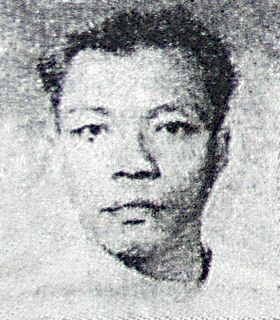
Max Tera was an Indonesian cinematographer and editor. He was employed by PERFINI in the 1950s and was a frequent collaborator with director Usmar Ismail.

Kamila Andini is an Indonesian film director known for her critically acclaimed debut The Mirror Never Lies.

Ponirah Terpidana is a 1984 Indonesian drama film directed by Slamet Rahardjo. Starring Nani Vidia, Rahardjo, and Ray Sahetapy, it follows a young woman named Ponirah who becomes a prostitute and is arrested for the murder of a rich businessman. The film, which combined traditional and contemporary elements, was a critical success in Indonesia. It won three Citra Awards at the 1984 Indonesian Film Festival, from a total of eleven nominations.
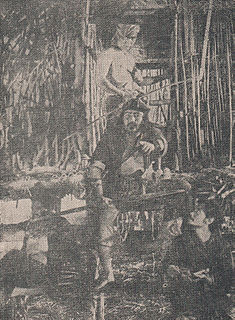
Anak Perawan di Sarang Penjamun is a 1962 Indonesian film directed and produced by Usmar Ismail for PERFINI. Starring Bambang Hermanto and Nurbani Yusuf, it follows a young woman who is kidnapped by a group of bandits, only to fall in love with their leader. The film, adapted from the 1940 novel of the same name by Sutan Takdir Alisjahbana, was repeatedly blacklisted by the Indonesian government and only saw release several years after production ended.

The Citra Award for Best Director is an award given at the annual Indonesian Film Festival (FFI) to Indonesian film directors in recognition for their achievement in the previous year. The Citra Awards, described by Screen International as "Indonesia's equivalent to the Oscars", are the country's most prestigious film awards and are intended to recognize achievements in films as well as to draw public interest to the film industry.
Nico Pelamonia was an Indonesian actor turned film director who won the Citra Award for Best Director in 1976 for his film Semalam di Malaysia. He has been involved in 33 feature film productions since his debut in Fred Young's Dibalik Awan in 1963.
Djaoeh Dimata is a 1948 film from what is now Indonesia written and directed by Andjar Asmara for the South Pacific Film Corporation (SPFC). Starring Ratna Asmara and Ali Joego, it follows a woman who moves to Jakarta to find work after her husband is blinded in an accident. SPFC's first production, Djaoeh Dimata took two to three months to film and cost almost 130,000 gulden.

Elly Joenara was an Indonesian film actress who later became a producer. She was the wife of producer Djamaluddin Malik.

Marjolein Tambayong, better known by her stage name Rima Melati, was an Indonesian actress and singer. She appeared in close to one hundred feature films, including works by Wim Umboh, Sjumandjaja, and Teguh Karya. She received multiple awards, including a PWI Award for Best Actress for Noda Tak Berampun, a Citra Award for Best Leading Actress for Intan Berduri, and five nominations for the Citra Award for Best Supporting Actress.
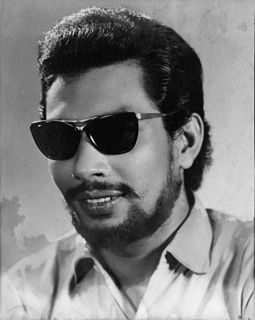
Farouk Achmad, often credited as Farouk Afero, was a Pakistani-born Indonesian film actor. After making his feature film debut in 1964, he rose to fame in 1970 with Bernafas dalam Lumpur. Afero ultimately appeared in more than sixty films.
















